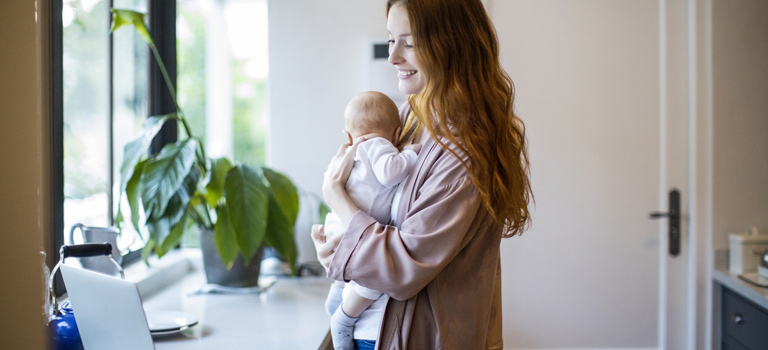Each year The National Safety Council designates June as National Safety Month to bring awareness to preventable injuries and death. With more than a third of child injuries and deaths happening at home, now is the perfect time to evaluate the safety risks in and around your home. Here are some tips to help ensure your home is a safe environment for your newborn and growing child:
Suffocation is the leading cause of death in children under the age of 1.
- Be sure your crib meets safety standards of the Consumer Product Safety Commission.
- Keep baby’s crib free of pillows, bumpers, stuffed animals and blankets.
- Put infants sleeping in a crib, not in the same bed as parents.
- Make sure drapery and blind cords are out of reach.
- Make sure the crib has no raised corner posts or cutouts. Loose clothing can get snagged.
Choking is another common cause of unintentional death for infants.
- Create a storage area for purses and bags that is out of reach of children.
- Keep small objects out of reach.
- Young children should be supervised while eating and playing.
- Keep loose or spare batteries locked away.
- Toys should not have buttons, heads or objects on them that can be pulled off.
Drowning is a tragedy that can be prevented. In 2018, 310 children under the age of 4 died from drowning.
- Use hands-on supervision during bath time.
- Install a fence around any pool or hot tub.
- Install a pool alarm.
- Keep the bathroom door closed when not in use.
- Always have rescue equipment (such as a shepherd hook or life preserver) by the pool.
- Keep a telephone by the pool with your local emergency number (usually 911) clearly posted.
Heat is also considered a high-risk source of injury.
- Adjust water heater temperature to 120 degrees Fahrenheit.
- Install smoke detectors and carbon monoxide detectors.
- Check the back seat for your baby every time you exit the vehicle.
- Keep your baby warm during sleep, but not too warm. Your baby’s room should be at a temperature that is comfortable for an adult. Too many layers of clothing or blankets can overheat your baby.
- Keep night-lights away from drapes or bedding where they could start a fire. Buy only cool night-lights that do not get hot.
- Do not pour hot liquids when your baby is close by.
- Do not leave your baby in the sun for more than a few minutes.
Poisoning exposure incidents occurred approximately 2 million times in 2018, and 44% involved children 4 or younger.
- Do not leave medications within your baby’s reach. Use a medicine box, preferably one with a safety lock.
- Store cleaning products and other hazardous materials out of baby’s reach.
- Get rid of any houseplants that may be poisonous.
- Make sure visitors lock and put away suitcases and purses containing medications.
- Program the Poison Help line into your phone: 800-222-1222.

